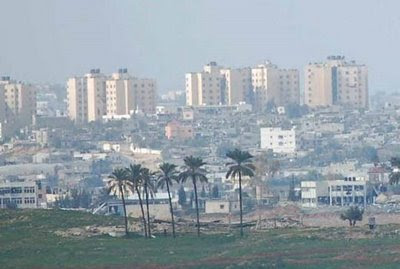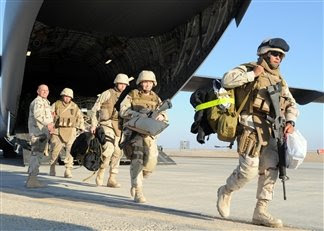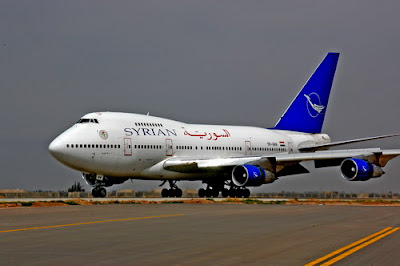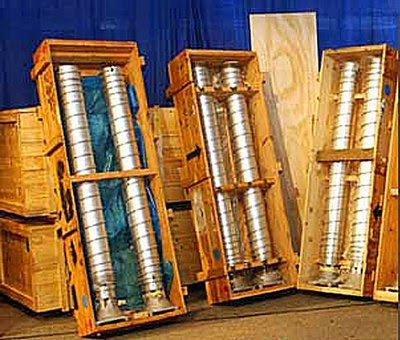 U.S. Army troops in Iraq
U.S. Army troops in Iraq
President Barack Obama announced his intention to withdraw American combat forces from Iraq by the end of August 2010, but that a residual force of as many as 50,000 trainers and advisors willh remain in the country until the end of 2011. The Status of Forces Agreement between the United States and Iraq requires that all American forces depart Iraq by December 31, 2011.
Of course, the anti-war groups that supported Obama during the presidential campaign expressed dissatisfaction with the plan, claiming that Obama promised to withdraw all force within 16 months and end the war. They also argue that leaving 50,000 troops in Iraq until 2011 is not "ending" the war.
Perhaps the President has had a reality check after the inauguration and realizes that setting arbitrary dates does not "end" wars, it loses wars.
Secretary of Defense Robert Gates would like to maintain a small number of U.S. troops in Iraq even past the SOFA deadline at the end of 2011. Gates says the force would be there to train Iraqi forces and possibly conduct intelligence operations.
Gates is correct - we should maintain a troop presence in Iraq for the foreseeable future. However, it goes beyond training the Iraqis and conducting intelligence operations. As long as Iran and Syria are involved in activities that are inimical to American national interests, and Americans continue to rely on oil as a primary source of energy, we need to be in position to conduct military operations in the Middle East. Iraq is centrally located to the area of operations and sits between the two countries that are major obstacles to peace.
The U.S. Ambassador to the United Nations accused Iran - rightly - of attempting to develop nuclear weapons and supporting terrorism. Syria is a conduit for Iranian money and weapons to Hizballah, Hamas and Islamic Jihad.
Maintaining an American force presence - especially an air base - reinforces the almost encirclement of the two countries by countries friendly to the United States. Keeping American troops in Iraq would enable us to exert diplomatic pressure backed up by U.S forces.









 The presence of a NATO force separate from the coalition force led by a U.S. Central Command (CENTCOM) general creates operational problems. NATO units - including the 14,000 American assigned to NATO in Afghanistan - receive orders via the NATO command in Belgium.
The presence of a NATO force separate from the coalition force led by a U.S. Central Command (CENTCOM) general creates operational problems. NATO units - including the 14,000 American assigned to NATO in Afghanistan - receive orders via the NATO command in Belgium.





 One of the sensitive and controversial elements of Saudi society is the religious police, the mutawa'in, the short name for the Commission for the Promotion of Virtue and Prevention of Vices.
One of the sensitive and controversial elements of Saudi society is the religious police, the mutawa'in, the short name for the Commission for the Promotion of Virtue and Prevention of Vices. Perhaps one of the more significant of the king's changes with long-term implications is the naming of his son-in-law Prince Faysal bin 'Abdallah bin Muhammad Al Sa'ud as education minister. (Photo right: Saudi fourth grade textbook.)
Perhaps one of the more significant of the king's changes with long-term implications is the naming of his son-in-law Prince Faysal bin 'Abdallah bin Muhammad Al Sa'ud as education minister. (Photo right: Saudi fourth grade textbook.)

 Most Israelis realize that the Heights are not, and have never been, part of Israel. The area has been occupied by Israel since it was seized by Israeli troops in the 1967 Six Day war. The area has been under Israeli administration - not annexation - for years. The arguments that the Golan Heights has strategic defense value no longer hold water. Syria does not need the plateau overlooking Lake Tiberias/Sea of Galilee (photo left)to strike those areas.
Most Israelis realize that the Heights are not, and have never been, part of Israel. The area has been occupied by Israel since it was seized by Israeli troops in the 1967 Six Day war. The area has been under Israeli administration - not annexation - for years. The arguments that the Golan Heights has strategic defense value no longer hold water. Syria does not need the plateau overlooking Lake Tiberias/Sea of Galilee (photo left)to strike those areas. Israel does have a valid concern about the loss of its huge signals intelligence site (photo right) on the Golan Heights at Tal Abu Nada/Har Avital (depending on whose map and language you use). More importantly, the Golan Heights are the headwaters of the Jordan River, one of Israel's primary sources of water.
Israel does have a valid concern about the loss of its huge signals intelligence site (photo right) on the Golan Heights at Tal Abu Nada/Har Avital (depending on whose map and language you use). More importantly, the Golan Heights are the headwaters of the Jordan River, one of Israel's primary sources of water.
 Last week, the Islamabad High Court ordered the Pakistan government to release nuclear scientist Abdul Qadir Khan from house arrest. Khan was placed under house arrest in 2004 after he confessed to operating a nuclear weapons technology proliferation network - the so-called "AQ Khan network."
Last week, the Islamabad High Court ordered the Pakistan government to release nuclear scientist Abdul Qadir Khan from house arrest. Khan was placed under house arrest in 2004 after he confessed to operating a nuclear weapons technology proliferation network - the so-called "AQ Khan network."














 Hamas, as well as Iran, is fully aware that Israeli elections are scheduled for February 10. When I was in Israel just ten days ago, the common belief was that the Likud party would win the election and Benjamin "Bibi" Netanyahu would emerge as the next prime minister.
Hamas, as well as Iran, is fully aware that Israeli elections are scheduled for February 10. When I was in Israel just ten days ago, the common belief was that the Likud party would win the election and Benjamin "Bibi" Netanyahu would emerge as the next prime minister.
